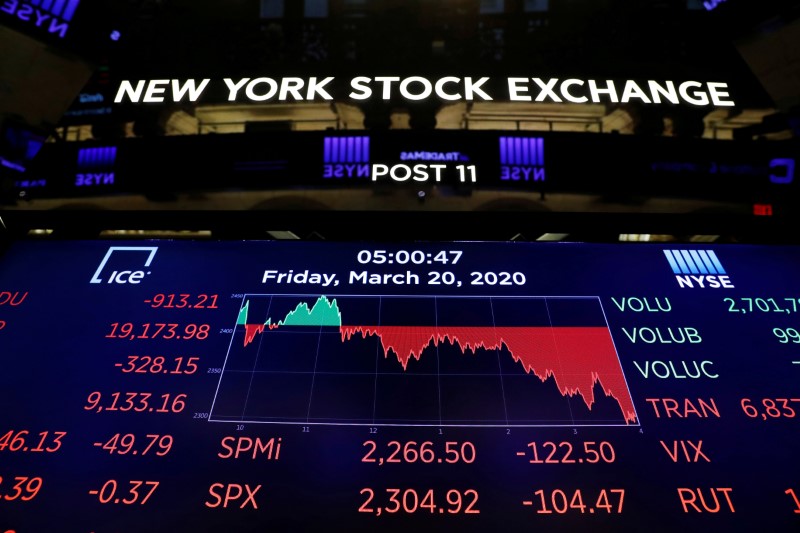By David Randall and Beth Pinsker
NEW YORK (Reuters) - The deepest U.S. stock market sell-off since the 2008 financial crisis is prompting some financial advisers to tell wealthy clients to hold steady or even increase their equity exposure if they have at least 10 years until retirement.
Remaining fully invested in stocks despite the volatility and economic shocks from the rapidly spreading coronavirus is easier said than done. Yet financial advisers predict a broad economic recovery without a depression, thanks in part to extraordinary Federal Reserve measures to backstop financial markets.
These advisers said they believe investors with a longer timeline have an opportunity to buy equities at low valuations.
The benchmark S&P 500 trades at a forward price-to-earnings ratio of 13.8, about 30% less than when it hit record highs on Feb. 19 and 11% below its long-term average, according to Refinitiv data.
"The reality is that no matter how you think about it, the next five-year return given these valuations is undoubtedly higher than it was two months ago," said Joe Duran, chief executive of Goldman Sachs Group Inc (NYSE:GS)'s United Capital division.
Duran is telling clients who feel they have to get out to either sell a small portion of their portfolio and move the cash to a bank account, or sell stocks with deep declines to book losses for tax write-offs.
The argument that stocks will quickly recover rests on assumptions never tested in such extreme conditions.
Markets can fall even further, warned Steve Chiavarone, portfolio manager and equity strategist at Federated Hermes. "If anybody tells you they're not professionally or personally nervous they're lying."
STAYING PUT
Financial adviser Charles Sachs, at Kaufman Rossin Wealth in Miami, does not think the market is near the bottom. Everyone is concerned, but the majority of his wealthy clients are staying put because they expect a quick rebound.
"The problem with a V-shaped recovery is that nobody rings a bell when you're at the bottom of the V," Sachs said.
Nick Hofer, a certified financial planner at Boston Family Advisors, said some clients are buying broad-based funds with the periodic cash payments from their private equity and venture capital investments.
"These volatility moves show that the market doesn't know when this is going to end," said Hofer.
Some wealthy people have no option but to stay put.
Leon LaBrecque, chief growth officer at Sequoia Financial Group in Troy, Michigan, said almost all of his clients with concentrated stock positions in individual companies inherited them, with a very low basis and would incur huge taxes if they sold. One client inherited stock with a $10,000 basis that is now worth $10 million.
They will be fine "unless you end up with bankruptcies or a significant protracted recession," LaBrecque said, pointing to an L-shaped market curve with an extended bottom.
